- Home
- Jessie Haas
Chase Page 9
Chase Read online
Page 9
Eggs. They were laying eggs.
He went to where the first hen was singing her own praises, boosted her gently out of the way, and palmed the warm egg into his pocket. He waited for the next announcement, and the next, and nestled the eggs in the coils of rope—four in all.
Now grab a bird and go, while the house was quiet. One hen still sat on her nest near the front of the mow. He started toward her, steeling himself and trying to quiet his conscience, troubled by the idea of interrupting the poor creature. He could wait, but he might wait too long, and it was a strange quibble. After all, he did plan to murder her.
The house door opened.
No time to get out of sight. Quick footsteps approached the barn doorway, and Abby came in.
Her hair was rough and uncombed, her eyes puffy with sleep. She reached for the coat without looking. For a long moment her hand stretched and felt for what it knew was there.
Her head turned. She stared at the empty peg and the floor below it. Then she looked up, and met Phin’s eyes.
His heart didn’t stop; he could hear his own pulse thunder in his ears. It was the world that seemed to stop, while the face below him paled, the eyes widened and darkened.
She whirled, with a swish of skirts. “Mum, the gun! There’s someone in the barn!”
17
THE LAST EGG
The word gun sent Phin running, without thought or hesitation. Down the ladder, sliding, skipping rungs; out the barn door and around the back, in a flurry of impressions—dresses bunched near the house, shouts. “Get in here!” “Lucky, no!” “Grab him!” Barks and thumps.
A grove of sumac trees flashed past. A rock-strewn slope fell away under him. Phin jumped down it, wide reckless leaps, with Lucky shrill at his heels. A tug at his pant leg; Lucky’s teeth—
He whirled, and Lucky skidded, eyes bulging, and drew back—a coward as well as a loudmouth. Phin looked for a rock, but they were all too big, grown into the sod. He took an egg from his pocket, threw it at Lucky—
Missed. The egg splatted yellow on the ground.
Lucky’s ears went forward. His nose wrinkled, sniffing. He approached the egg warily, but with great interest. Phin looked wildly uphill.
He could see the peak of the barn above the treetops. Everything else was screened off by brush. He was already in another world—an old pasture rimmed with stone walls and growing up to saplings and junipers. Though he could hear Abby’s voice clearly—calling Lucky, worried; she liked the dog better she let on—she seemed far off.
Delicately, Lucky began to lap at the egg. “Lucky, come!” Abby cried, and then—“No, Gran! You’ll hit him!”
Phin took one long walking step, another, watching Lucky over his shoulder. The dog ignored him, busy with his egg.
Phin took off running, only it felt more like flying, the hill was so steep. It tipped him down faster and faster, till he hit level ground at the bottom with a jolt that almost dropped him.
He paused to look back. Lucky was trotting uphill, licking his chops. He could see a bit of house roof now, a pair of windows like watching eyes—
He ran again, leaping a juniper, dodging a woodchuck hole. Cold air sawed at his throat. Make it to the stone wall at the bottom of the field. He could hide behind that for a moment, catch his breath.
As he got closer he saw, below the wall, a graveyard, dark slate markers in tilting rows. The walls that ran everywhere across these woods and fields came together here to make a small square pen, the land within it sunken. Phin swung himself over the wall, cradling the egg pocket, and dropped down among the graves.
From this side the wall was chest high. He leaned against it, hands on knees, breath coming in sobs. He was hidden here; safe, for a moment.
When he’d gotten enough air, when he was only breathing hard, he turned to look uphill at the empty field, the buildings showing above the treetops trim and sound, like prosperity defined.
Prosperous. The opposite of how Phin felt. He patted the coat, trying to account for an empty-handed feeling. He’d lost something, forgotten something—
Oh.
The flour sack. His turnips, his corn, his handfuls of oats. In the hay, next to where he’d slept.
Well.
Oh well.
Well, he was lucky. He still had the eggs.
Unbelievably lucky.
Better eat them soon, or he’d end up licking them out of the coat pocket.
He turned from the sight of house and barn, from thoughts of hens and turnips, and looked at the gravestones.
He could make out a face atop one, with wings where the ears should be. The shallow, flowing letters were mostly unreadable, though one name recurred everywhere: Collins. This must be a family graveyard. That meant town was faraway. Otherwise wouldn’t they bury their people there?
In the center of the plot was a newer stone, not slate, but granite, large, thick, and polished. The words on it were readable even from a distance: “Randal Collins, 1830–1864 Beloved Son, Husband, Father.”
There were more words, smaller letters. Phin went closer and the stone stated, “He died to make men free.”
That was from “The Battle Hymn of the Republic.” “As He died to make men holy let us die to make men free”—The back of Phin’s neck prickled. Without a doubt, he stood at this grave in the man’s own coat.
He almost took it off. Leave it folded on the grave, that was the right thing to do, with the rope and the three eggs on top of it, and move on.
But something steadied him, even as his fingers worked at a button. The stones stood still around him. Easy, boy, they seemed to say. No hurry.
He looked around with eyes that felt freshly opened. A little path was worn from the gate to Randal Collins’s grave. A dent in the sod, an old dent; grass had grown to cover it and had not been trampled this season.
“A child said, What is the grass? fetching it to me with full hands;—”
Phin looked up at the pearly sky. He drew a deep breath, full of the spice-scent of the brilliant leaves, and he remembered the sun rising through John Engelbreit’s front door as he surfaced from that poem.
He was part of everything, and everything was part of him. That was what he’d felt, reading through that night and in those few moments when the door stood open. The grass was alive with meaning and so was he, and nothing was dead. No one was dead, not these Collinses all in rows, not Engelbreit. Everything was different than what people supposed, Whitman said. It was better—
And he should think. It was time to think.
With utmost control, he dented the end of an egg on the stone, pried shell fragments out of the shallow crater he had made, and through the tiny opening sucked the thick liquid. And considered.
He’d allowed himself to be driven from the beginning, by Plume and Fraser, and now Lucky and that word “gun.”
This could go on a long time. The country was broad and wild and men disappeared into it, running from the past.
But if he let himself be driven to the margins of society—another egg—for a crime he hadn’t done, Phin knew he would regret it. He’d grown up in a barroom. He knew the margins. He wasn’t attracted to them.
So—time to stop running. Time to walk uphill, fold this coat over his arm, and knock on the Collinses’ door and apologize, tell his story. He dreaded it, he dreaded the gun and their eyes and the questions, which would be sharp, but in the end he’d get his knees under a table again, he’d get properly fed and properly clean, and respectable people would help him think things through.
He crushed the second eggshell in his hand, dropped it outside the wall, and was reaching for the third—because what if they didn’t feed him?—when a sound caught his attention: hoofbeats, crunching on dirt.
The farm road passed just outside the gate. Phin ducked behind Randal Collins’s stone as a lank horse came into view, pulling a buggy. He couldn’t see the driver, just a pair of hands flicking the reins at the laboring animal.
Behind the buggy, the stallion making the hill seem light work, rode Fraser.
Phin’s legs weakened. He dropped to his knees, hot all over, and then cold. How had Fraser found this place? Through the screen of leaves and branches he watched the turning wheels, the stallion’s legs, slender and springing, Fraser’s boot heels and the tail of his long coat. Up the hill they went, disappearing behind the trees.
The moment they were out of sight, Phin sprinted across the graveyard and vaulted the downhill wall, out into another brushy pasture. Run. Run.
Over his pounding feet he heard Lucky bark far off. Had they reached at the farm already? The women would tell—their alarm was fresh. Abby could describe him—
He was exposed again, out in the open, but at the bottom of the pasture ran another stone wall and beyond it, woods. Phin put on a burst of speed and threw himself over the wall with what felt like the last of his strength. He turned to look back.
The gable end of the house stood high above the treetops, dominating the hillside like a fort. Lucky was barking, and—
—did he really hear that? He held his breath.
Yes. Something large was crashing downhill. In a moment he made out a dark shape moving beneath the sumacs.
Fraser. The stallion.
The horse’s head was low as he picked his way down the rocky slope. Fraser sat easily, leaning back, scanning the pastures.
Phin couldn’t look away. The horse’s oily, supple motion mesmerized him. He should be running, but he was afraid to make a sound, and anyway he couldn’t, not until he got his breath and the weakness went out of his legs.
The stallion kept coming. Phin found himself reaching into his pocket for the last egg. There might be time, just time, to eat it. One way or another it could be a while before he ate again.
Like a soldier watching the start of a distant enemy charge, braced, heart beating light and rapid, he tapped the pointed end of the egg on the wall. He was proud of having the self-control to do this perfectly, not tap too hard, not waste the only food he had. He sucked, and watched.
Horse and rider reached the more level part of the pasture, but the stallion didn’t lift his head. He still seemed to seek his way carefully, pausing only at one small juniper and circling it, a bit later zigging around a mound of dirt—
The woodchuck hole. Phin had dodged it. Now the horse dodged it, too, and came straight down the hill to the cemetery wall exactly where Phin had.
He raised his head, sniffing the stones where Phin had swung over. Fraser turned him in a circle and put him at the wall. He jumped it, mane and tail and Fraser’s long coat flying, and landed among the graves.
It was the stallion tracking him. He was being followed by his smell.
18
BEAVER DAM
In one of those moments out of time, thoughts out-pacing events, Phin sensed the envelope of scent around him; sweat and hay and old wool coat, mud, crushed grass, body heat. Wherever he went he left traces on the air, as continual as candle smoke, as individual as a signature.
The stallion moved among the tombstones. Phin whirled, trying to see and think and run all at the same time. Deeper into the woods—Fraser was a whole field away, so he didn’t worry about noise—just space, just go. He wasn’t fast enough, didn’t have a big enough lead, couldn’t keep this up. Tree trunks flashed past. Amazing. No strength, but he was running anyway.
Brush ahead. It might slow the horse, and he zigzagged through it, but how did he muddle a scent trail? He’d read Uncle Tom—bloodhounds in that. But a horse wasn’t a hound. He hadn’t even known they could do this. Could they do this?
The stallion was doing it.
A stone wall. He raced precariously along the top like the fox fleeing dogs, slipped, banged his good shin, paused to listen.
Nothing?
Wind?
Or distant hoofbeats?
Go. Go.
Bitter thoughts ran with him. All the time he’d spent stroking the stallion, the oats he’d given, his hands under the flaring nostrils, as if he’d been trying to imprint his scent in his pursuer’s memory.
Had the stallion known he was in the wagon? In the railcar?
Of course, and so had Fraser. Fool! It seemed so clear now. How could he have missed it? When he coughed, and Fraser led the horse in circles, covering the sound; when he said “he’s here,” mischievously echoing Plume’s words. Then why had he done nothing? Why?
Phin leaped down a slope. Another little brook; this one trickled out of a deep ravine in the hillside. What else did foxes do? They had tricks for eluding hounds—
Water. Phin ran up the brook into the dark closet of rock.
If Fraser knew he was in the railcar—he’d known!—then why did he keep quiet? Why was he following Phin at all? He didn’t believe the tale of Engelbreit’s murder—didn’t seem to…
Up and up the dark slot. It grew deeper, the sides too steep for a horse to climb. Get out here, then, confuse the trail some more. A tree root reached down, as if offering a friendly arm. Phin wrapped his hand around it and hung with all his weight, testing. It held, and he scrambled up.
Higher than he’d thought.
Don’t look down.
He elbowed his way onto a bald rock ridge, his whole body scraping earth. That would leave a big scent, but maybe the horse would never get up here to find it. Maybe he’d been clever enough.
He was hot in the coat, reeking with sweat. Wonderful! But if he left the coat, he’d be cold at night, and if he took it off, he’d have to carry it. He unbuttoned it instead, and stood up and flapped the hot air away from his body—
Did Fraser want the paper? Want Phin as a witness? Or did he believe the murder story after all?
Listen.
Something trampling? Or was that his pulse, gushing in his ears?
No. Something out there. Coming.
He turned all the way around once, determined to keep thinking, not run in panic.
There was only one obvious way to go; along the ridge he’d just climbed onto. It ran parallel to the hillside. This seemed to be the low end. Ahead it bulged higher, and Phin was reluctant to go up. He didn’t feel strong enough for climbing.
But the rock was almost bare up there. Less vegetation to catch his scent. It was really the only choice, and it turned out he could climb. He always had more strength than he thought. He moved swiftly, stepping over moss patches, trying to walk only on the balls of his feet.
That cloth Fraser held under the stallion’s nose—his jacket? Had to be; left in the Sleeper’s hands when he fled after Engelbreit’s murder.
How did Fraser get it?
How did Fraser get it? How did he come into things? Was he a lawman? Coal and Iron Police? Pinkerton detective?
Or a free agent, out for his own advantage? The country was full of men like that, set loose by the war. They’d come back readier to kill, his mother said, and some didn’t come back at all, but took to roaming.
What would a man like that want with Phin Chase?
That was easy. Money. A reward—from the Sleepers, maybe, or the owners, or the Pinkertons. That meant he couldn’t let Plume in on the capture. He’d needed to get rid of Plume first; then snatch Phin and settle in to bargain. So he’d waited—a man with a dangerous degree of self-control. Phin must have the same. Think.
The horse had scented him in the air. He pictured the stallion gazing uphill at him, nostrils flaring.
So he should think about wind. The wind had hidden him from Lucky; it could hide him now.
He licked a finger and held it up. It got cold on the right, the uphill side. The wind was blowing across his line of flight, and that was good, maybe.
He continued in the same direction, testing the wind whenever he stopped to catch his breath. The overcast was burning off. Misty-blue patches of sky showed between the leaves. All seemed quiet behind, but he didn’t believe in quiet anymore, didn’t believe he’d shaken off pursuit.
The t
rees thinned. There was more light, brilliant, mirrored light. Phin went toward it, noticing dead trees now, and pointed tree stumps, a broad pond, logs on the ground, their tops drowned in the water. Other dead trees rose out of the pond, black and truncated. It was a scene of desolation, but around the shore the living trees flared vivid red and orange.
This must be a beaver pond. Phin had never seen one. As with so much else, he knew them from talk at Murray’s. Upstream, brush closed thick around a slow brook. Downstream he glimpsed another dam, maybe two, gently descending like terraces.
Had the beavers abandoned this pond? How would you tell? He listened. Hardly any birds, even; just rustling cattails and the lap of tiny waves at the shore.
A heap of sticks in the middle of the pond drew his eye. That must be the lodge. The beavers had built it and lived inside, getting in through underwater entrances. It looked like a fort out there, surrounded by green glittering water—
Phin shivered in his sweat inside the heavy coat. His body knew what he was going to do. His mind took its time coming to conclusions.
A horse couldn’t cross a beaver dam, right? Too heavy. Whereas a man on foot could.
And water deadened scent, right?
And out there in the water was a fort, ready made.
Right?
He shuddered. Was this neccessary? There was no sound behind him, no sound at all—
But there was something below the level of sound, like a pulse on the air—and if he was going to do this, it would take time. He couldn’t wait until he was sure. That would be too late.
He made his way toward the dam. Muck and bog guarded the approach. Reluctantly Phin took off his boots.
He hadn’t wanted to know how bad his socks were. He hadn’t wanted to disturb things or even think about his good luck. No blisters. His barefoot years had stood him in good stead. Until he worked for Dennis, he’d rarely worn shoes in warm weather, and the soles of his feet were tough as a blacksmith’s leather apron. But “Bare feet and horses don’t mix,” Dennis had said, and his mother had gotten him good work boots, knitted him good socks—

 Chase
Chase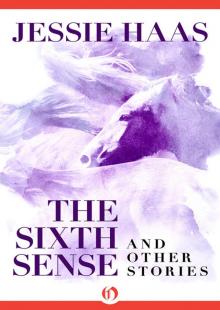 The Sixth Sense
The Sixth Sense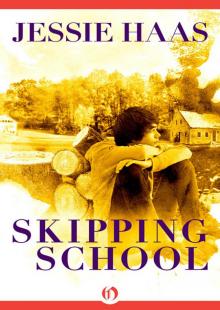 Skipping School
Skipping School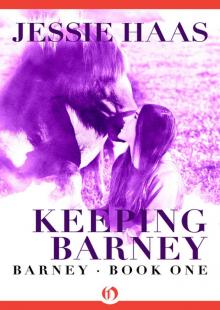 Keeping Barney
Keeping Barney Unbroken
Unbroken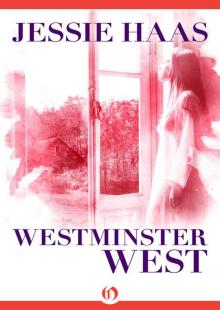 Westminster West
Westminster West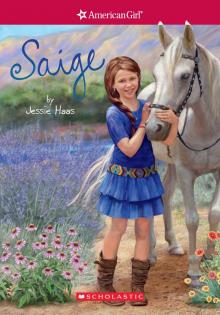 Saige
Saige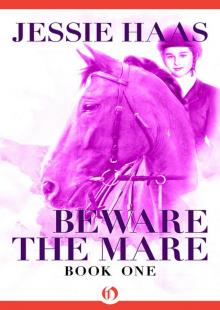 Beware the Mare
Beware the Mare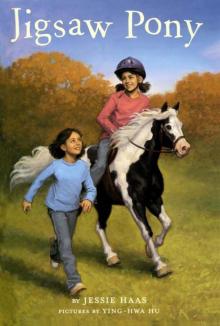 Jigsaw Pony
Jigsaw Pony Rescue
Rescue Saige Paints the Sky
Saige Paints the Sky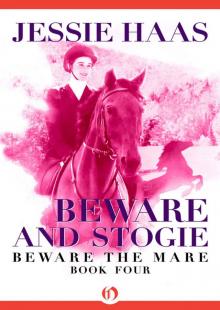 Beware and Stogie
Beware and Stogie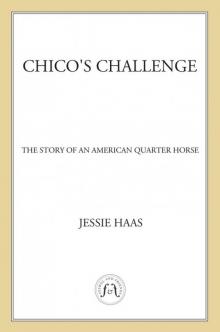 Chico's Challenge
Chico's Challenge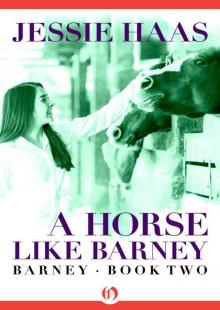 A Horse like Barney
A Horse like Barney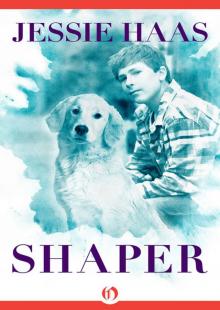 Shaper
Shaper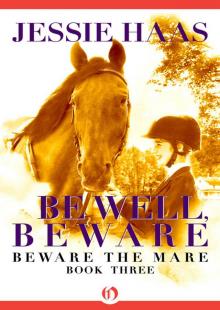 Be Well, Beware
Be Well, Beware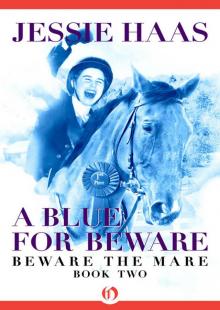 A Blue for Beware
A Blue for Beware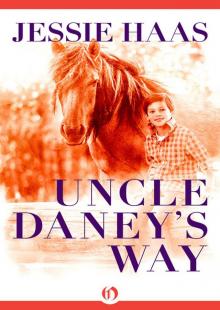 Uncle Daney's Way
Uncle Daney's Way